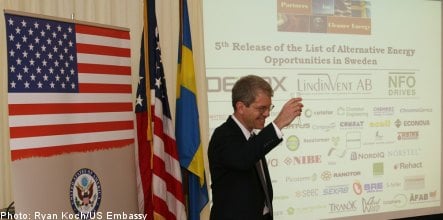Officially called the List of Alternative Energy Opportunities, the US embassy’s “A-List” is an outgrowth of former US ambassador Michael Wood’s “One Big Thing” (OBT) initiative to introduce Swedish companies to potential US investors and partners.
Two of the three new additions – LindinVent AB and NFO Drives – provide solutions to help make buildings more energy efficient.
The third company added to the list, Detox Biogas, specializes in harnessing biogas from algae while at the same time removing heavy metals from over-fertilization, and brings the total number of companies on the embassy list to 52.
“With this latest update, Embassy Stockholm is carrying on the tradition of finding the next technological breakthrough in clean technology,” said US Embassy Chargé d’Affaires Robert Silverman in a statement.
“It’s amazing that our project, which began as a rather small idea, has grown so much. I am excited for the future of US-Swedish cooperation.”
At a Tuesday afternoon ceremony, Silverman added that his preliminary conversations with Matthew Barzun, President Barack Obama’s choice to become the US ambassador in Stockholm, indicated that the OBT initiative will continue.
“I’ve spoken with the incoming ambassador, Matthew Barzun, and he told me he is very committed to continuing with OBT and the A-List,” Silverman said.
The US Department of Energy’s former top official for renewable energy, Andy Karsner, was also on hand at the event.
Karsner, who played a pivotal role in the early stages of Ambassador Wood’s efforts and is now a sought after advisor to clean tech companies, is also confident that Barzun will continue the tradition set by his predecessor.
“Matthew Barzun has been in touch both with me and Michael Wood and all indications are that he plans to continue and elevate the work to new levels. He’ll do a great job,” Karsner told The Local.
Karsner praised OBT as “ground breaking” for “how the United States reaches out to its partners around the world to meet the energy challenges of the 21st century.”
And according to at least one veteran of the “A-List”, it’s hard to overestimate the power of backing from a US ambassador.
“Michael Woods has done more for my company than any official or agency in Sweden. If a US ambassador says something is good, people listen,” said Matts Lindgren, whose company, Nordiq, produces technologies to help make buildings’ climate control systems more efficient and has been on the list for two years.
Johan Barwén, marketing managers for newly added Detox Biogas, is excited about the opportunities that recognition by the US embassy might bring.
“We hope it will help us meet people that can help us with our expansion,” he said.
“It’s a confirmation of what we’ve believed in all these years – that we have something of interest to the international market.”



 Please whitelist us to continue reading.
Please whitelist us to continue reading.
Member comments